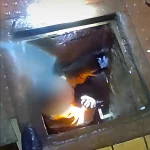Study Claims 85 Percent of UK Broadband Users Suffer Connection Issues

A new survey of more than 4,347 UK adults with a home broadband ISP contract, which was conducted between Dec 2024 and Jan 2025 by Which?, has claimed that 85% of respondents have experienced at least one “connection issue” in the past year (e.g. slow speeds, connection drop-outs, and router problems). Customers of Sky Broadband and Virgin Media were the worst hit.
The survey reveals that the top issue is still “slow downloads and uploads” (28%), which is confusingly followed by the samey “very slow speeds” (26%), frequent connection drop-outs (22%) and router problems (21%). Furthermore, some 15% said they had also lost internet connectivity for more than an hour and 8% said their connection had dropped for more than a day.
Apparently, Sky Broadband was the worst provider for “slow downloads and uploads“, with some 39% of their customers on the survey claiming that they frequently had problems. On the flip side, some 47% of Plusnet’s customers said they had NOT experienced slow downloads or uploads in the past year.
Advertisement
In addition, Sky Broadband were also found to be the worst provider for “very slow speeds“, with some 37% of their customers claiming to have frequently been affected by this. On the flip side, Zen Internet customers were least likely to suffer slow speeds (54% said they had NOT experienced this problem at all).
However, we aren’t quite sure why Which? opted to ask two questions about essentially the same thing (i.e. “slow downloads and uploads” vs “very slow speeds“) in their survey, which isn’t helped by the fact that the question isn’t well-defined and is highly subjective.
Finally, Virgin Media and Sky’s customers were also found to be the most likely to experience internet outages, with 22% on Virgin Media and 21% on Sky Broadband saying they had “frequently been left without their connection for more than an hour“. But we’ve no way to tell whether this was caused by the ISP or something else within the network, such as a local connectivity problem (router fault, weak WiFi signals etc.).
We should point out that not every person has the necessary skills to correctly identity and diagnose the cause of internet or network connection issues, which tends to result in all such gripes being levelled at the broadband provider. As usual, opinion surveys like this should always be taken with a pinch of salt, especially given the likely small sample sizes for ISP specific results. The fact that we only get partial and sporadic results for just four ISPs certainly doesn’t help.
Advertisement
However, we can speculate that one of the reasons why Sky might be suffering from so many speed issues is because they still have a sizeable base of ADSL and FTTC customers – connection types that often suffered from slow speeds due to signal degradation over distance on older copper lines. Providers with a higher proportion of FTTP customers should be seeing fewer disconnection events and speed issues.
At the same time it’s worth noting that, according to Ofcom, Sky Broadband tends to attract relatively few consumer complaints about their service (here).
Mark is a professional technology writer, IT consultant and computer engineer from Dorset (England), he also founded ISPreview in 1999 and enjoys analysing the latest telecoms and broadband developments. Find me on X (Twitter), Mastodon, Facebook, BlueSky, Threads.net and Linkedin.
« The Curious Case of Openreach’s £73k FTTP on Demand Install Quote






















































I reckon the majority of the problems is Wi-Fi, people expect Wi-fi to be fantastic and the problem these days is that it is relied on for far too much.
For your phone or tablet, it is fine, but when it comes to video streaming, it is not fine, certainly if your router is a bit of a distance away from your devices.
I have been to a few places over the years when people say they have no internet or bad internet and on observation find their internet/broadband is fine. Even with the so called unreliable FTTC.
I hear even on Faeache, the page that my ISP has, I have no broadband, question them a bit, and it is the Wi-Fi, my provider don’t help that way by provider useless routers.
Nearly 2 years for me and only a small problem at the start, due to someone digging up a main fibre, since then, 100% connection, but then I use Ethernet where I can, and I recommend other people to do the same.
The problem with a lot of these streaming sticks is the lack of direct connection
Have to agree with you there. Wifi is good for portable devices but it is nearly always outperformed by an ethernet connection. Some devices like the Amazon Firestick do have option of a wired adapter which is what I use, our house is wired with gigabit ethernet.
@Big Dave, While Firesticks may be able to have an adaptor, that is more money that need to be paid out and more stuff hanging off. These streaming sticks/boxes need a lan port built in, so it may make them larger, but so what?
It is all down to how cheap they can be made.
I cable up everything I can, including my printers, which don’t need the speed, but I want the reliability of Ethernet, something Wi-fi don’t give.
So many people rely on Wi-fi for their smart TVs
Something we definitely agree on. I wire up everything that I can – have to when you’ve got multiple Gbps of internet coming in 😉 But WiFi can work really well. There’s just one problem, high quality WiFi access points (I mean strictly just AP’s) are very expensive and will be something 95% of folk won’t be interested in. 1.3Gbps to an iPhone is very realistic with the right kit.
Surveys aimed at selling subscriptions to Which data on what provider to select….
With most trying to stream via WiFi on a subpar flaky FTTC connection via WiFi that’s congested by kids streaming Disney, Netflix etc they’re going to see issues. Makes me crazy when I ring Plusnet and they say “I can see 15 devices connected to your router, this is the reason you’re internet is running slow” when I’ve switched off all WiFi and connected to ethernet!
If FTTP were at our old address I’d have taken it, and with over 60+been left with a flaky inconsistent FTTC connection but the other half of the houses bask in FTTP glory, it’s no wonder users slate the system! Openreach fail to give a reason to why they left 60 houses out, and I even had an engineer at the old property tell me that the issue is a faulty cracked length of aluminium but they refused to change it, and when I’ve appealed the engineers in the street they seem to think the street is FTTP till you tell them.
So it’s understandable why users were getting connections that are slow intermittent etc.
I would love to hear what OR’s excuse is for missing out those poor customers, but I’m thankful where I currently live now just 5 mins down the road from the Afflicted area, we have FTTP!
Sky Broadband what a joke i have a City…
Sky Broadband what a joke i have a City Fibre broadband
Sky now selling City Fibre
So I rang asked about placing an order CityFibre No problem we will take over working line take over I got a price deal i thought about it
I rang back next Day to place an order Mentioned i have CityFibre the woman agent was sarcastic I know what city Fibre broadband is I asked about one touch switch she said they don’t support one touch
which is strange as its on sky website told me I have to contact my ISP and cancel my self i placed the order
2 days later BT contacted me they going to install BT Broadband
I have been trying for 3 hours to contact sky with no success
Ai rubish we are Now closed
But recorded message plays we are open from 8 30am to 11pm
Shit support
I managed Today to cancell Order
i got why do you want to Cancell
Why dont you want BT
These surveys are rather meaningless for reasons pointed out in the article. In addition to that, the demarcation point between the ISPs responsibility and the consumer’s responsibility has been increasingly blurred over the last decade, which confuses things more.
Tangentially related, I’m surprised more new builds aren’t having ethernet connections between rooms in a similar fashion to how phone lines used to be put in multiple rooms. I have a hypothesis that a lot of network issues could be sorted by adding just a second wireless access point to homes which is directly wired to the main router (ie, not a repeater or a purely wireless mesh setup which a lot of ISPs seem to be opting for).
Cost cutting by the builders is why new homes aren’t having ethernet installed. It’s high time that the building regs were updated to make them install at least 1 ethernet socket in each room back to a central patch panel in CAT 6 adjacent to where the broadband service enters the building. A friend of mine has a house where all the partition walls are done with plasterboard which is foil backed and it absolutely kills wifi in her house.
@Big Dave: Foil-backed plasterboard has foil to act as a vapour barrier and is used for exterior walls, but foil-backed plasterboard for interior walls makes no sense.
And could be due to a slow computer.
I think they stopped making those about 20 years ago 🙂
Meh, maybe. Most people will be using their phone or some Apple product. It’s unlikely to be major concerning factor in this study.
That isn’t to say the study isn’t inherently biased, it is. The average person has no clue how ISPs work, the internet is often colloquially called “WiFi.”
Half the issues are going to be related to the WiFi, half of the half are going to be user issue, and the rest may be other factors including genuine faults.
However, I doubt buy the headline claim that 85% have real issues. I do acknowledge the article accounts for this with the pinch of salt comment.
You can’t really believe any survey questions where non-technical users are asked about their broadband connection, because you get people on a 20Mbps service that is delivering that speed complaining that they only get 20Mbps, or that it’s not as quick on Wi-Fi through three stone walls. The only relevant survey is one about the quality of customer service, billing issues etc., everything else should be metrics on things like latency, peak time degradation etc.
Getting results back showing 85% of people have fixed line connection issues should have prompted some level of scepticism from Which.
Yes. The reason why its a very old network. I would know because I try to fix the faults. Lots of the work is going away from Openreach(BT) and being contracted. Unfortunately they get paid per job so really if it’s a difficult fault there is no chance it will ever be fixed. Welcome to the future of engineering.
It’s getting overbuilt. Fix in many cases to copper issues will be to move to FTTP which needs far less maintenance.
Both Openreach and Virgin Media pulled back on it as no point spending too much on plant you want to retire ASAP.
The actual problem is the general user’s understanding of how there broadband works. They have slow connection or lose connection and by default blame their broadband when actually it is due to their WiFi dropping most of the time which is caused by their own house.
True indeed. Every time someone says “my Wi-Fi is slow”, I ask what they actually mean. People have no clue, though it seems obvious to me, that a connection is only as good as its weakest link, which might be in the room!
I wonder if the reports are related to TV streaming rather than actual internet usage (web browsing, eMail). Streaming requires a consistent data stream whereas internet operations are much more bursty. Most people rely on WiFi rather than having their streamed devices connected by cable.
Wonder how many people are blaming their ISP for problems with their WiFi environment or equipment. I would bet that’s far more common than true ISP outages. Well, except for Virgin Media of course, who seem to go uniquely out of their way to have downtime.
I have a 5 Gbps plan from my local ISP in israel and download speed is consistently around 14 MB/S no matter the site or time of day. The ISP is obviously throttling the speed of customers in order to save bandwidth. What’s worse is the fact “speed testers” like Ookla falsify results claiming the connection is much faster when it clearly isn’t. ISP thinks it can fool me but it cannot since the numbers don’t lie.
Probably find your speed on their network or locally within Israel is full speed so the speed test server you’re hitting provides a decent result but downloads from elsewhere not so much. If you tried an Ookla server outside of Israel might see a throttled result.
What are you testing and getting 14 MB/s on?
I suspect in most cases the problems are with the user rather than the ISP
In that case the problems reported would match the distribution of customers to ISPs.
I know someone on Sky FTTC who had connection issues last summer, presumably due to the heat.
Although it didn’t help that Sky said ‘there was nothing wrong’.
I also know someone else who was previously with Sky FTTC but didn’t seem to grasp that the Openreach connection was simply limited, despite paying for faster speeds.
Over 4 years on A&A and I think one tiny connection blip in all that time. This is on Openreach VDSL, as we’re still in a fibre desert. Hopefully it’ll get even more reliable when we finally join the fibre revolution, years after the rest of the world…
I’m with county broadband and I’ve had multiple outages this year. It has been that bad that I’m now paying for a 4g service aswell as a fail over for my internet. The problem where I am is no one else offers fibre so it’s county broadband or fttc.
Why would anyone want to see carol Kirkwood in a bikini?
I suspect the issue is more with their WiFi than the ISP. Most people take the basic ISP offering but may have a dozen items connected to their WiFi hence it will struggle